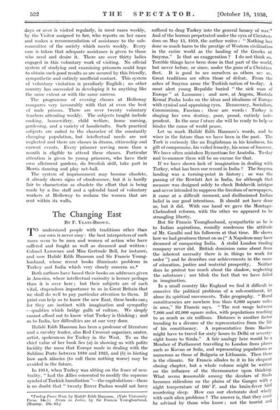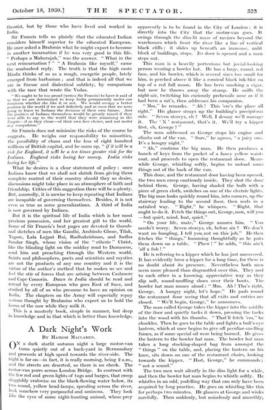The Changing East
BY F. YEATS-BROWN.
TO understand people with traditions other than our own is never easy : the best interpreters of such races seem to be men and women of action who have suffered and fought as well as dreamed and written : Colonel Lawrence and Miss Gertrude Bell, for instance, and now Halide Edib Hanoum and Sir Francis Young- husband, whose recent books illuminate problems in Turkey and India which very closely concern us.*
Both authors have based their books on addresses given in America, where intellectual curiosity is keener perhaps than it is over here ; but their subjects are of such vital, stupendous importance to us in Great Britain that we shall do well to pay particular attention to them. If print can help us to know the new East, these books can; for they arc instinct with imagination and sympathy —qualities which bridge gulfs of culture. We simply cannot afford not to know what Turkey is thinking ; and as to India, her difficulties are at our very door.
Halide Edib Hanoum has been a professor of literature and a cavalry leader, also Red Crescent organizer, orator, artist, spokesman for Turkey in the West. To us the chief value of her book lies (a) in showing us with polite lucidity the mess that Europe made in dealing with the Sublime Porte between 1910 and 1925, and (b) in hinting how such idiocies (to call them nothing worse) may be avoided in the future.
In 1914, when Turkey was sitting on the fence of neu- trality, " had the Allies consented to modify the supreme symbol of Turkish humiliation "—the capitulations—there is no doubt that " twenty Enver Pashas would not have 'Turkey Faces West, by Halid4 Edib Hanoum. (Yale University Press. 14s.) ; Dawn in India, by Sir Francis Younghusband. (Murray. 10s. 6d.)
sufficed to drag Turkey into the general lunacy of war." And of the horrors perpetrated under the eyes of Christen- dom on May 15, 1919, the author writes : " Nothing has done so much harm to the prestige of Western civilization in the entire world as the landing of the Greeks at Smyrna." Is that an exaggeration ? I do not think so. Terrible things have been done in that part of the world, but never before, or since, under the guns of a Christian fleet. It is good to see ourselves as others sez us. Great traditions are often those of defeat. From the ashes of Smyrna arose the Turkish nation of to-day. A most alert young Republic buried " the sick man of Europe " at Lausanne ; and now, at Angora, Mustafa Kemal Pasha looks on the ideas and idealisms of Europe with cynical and appraising eyes. Democracy, Socialism, Communism, Fascism : these are words : Turkey is shaping her own destiny, poor, proud, entirely inde- pendent. In the near future she will be ready to help or hinder the cause of world peace.
Let us mark Halide Edib Harioum's words, and be wiser in the future than we have been in the past. The Turk is curiously like an Englishman in his kindness, his gift of compromise, his veiled ferocity, his sense of humour. We have often mistaken Byzantium for Anatolia. To-day and to-morrow there will be no excuse for that.
If we have shown lack of imagination in dealing with Turkey, what has been our record in India ? The Smyrna landing was a turning-point in history ; so was the passing of the Rowlatt Act in India, for although that measure was designed solely to check Bolshevik intrigue and never intended to suppress the freedom of newspapers, it came at a difficult moment, and disillusioned Indian belief in our good intentions. It should not have done so, but it did. With one hand we gave the Montagu- Chelmsford reforms, with the other we appeared to be strangling liberty.
But Sir Francis Younghusband, sympathetic as he is to Indian aspirations, roundly condemns the attitude of Mr. Gandhi and his followers at that time. He shows how we had greatness thrust on us (" A Napoleon may have dreamed of conquering India. A stolid London trading company never did. British dominion came about from the inherent necessity there is in things to work for order ") and he describes our achievements in the cause of education, justice and material prosperity. Neither does he protest too much about the shadow, neglecting the substance ; nor blink the fact that we have failed in imagination.
In a small country like England we find it difficult to conceive the political problems of a sub-continent, let alone its spiritual movements. Take geography. " Rural constituencies are nowhere less than 6,000 square miles in area," Sir Francis says. " The rest range between 7,000 and 62,000 square miles, with populations reaching to as much as six millions. Distance is another factor trending to a divorce of the representative from the life of his constituency. A representative from Madras might have to travel for sixty hours to Delhi or seventy- eight hours to Simla." A fair analogy here would be a Member of Parliament travelling to London from places such as Kovno or Sofia, and representing populations as numerous as those of Bulgaria or Lithuania. Then there is the climate. Sir Francis alludes to it in his eloquent closing • chapter, but a whole volume might be written on the influence of the thermometer upon thinking. What seems seasonable among the deodars of Simla becomes ridiculous on the plains of the Ganges with a night temperature of 100° F. and the brain-fever bird murdering sleep. How can our electorate deal wisely with such alien problems ? The answer is, that they must be advised by those who know ; not the tourist and theorist, but by those who have lived and worked in India.
Sir Francis tells us plainly that the educated Indian considers himself superior to the educated European. He once asked a Brahmin what he might expect to become in another incarnation if he was very good in this life. " Perhaps a Maharajah," was the answer. " What in the next reincarnation ? " " A Brahmin like myself," came the unabashed reply. The truth is that the high caste Hindu thinks of us as a rough, energetic people, lately emerged from barbarism ; and that is indeed all that we are in finesse and dialectical subtlety, by comparison with the race that wrote the Vedas.
" We ought to be too proud [writes Sir Francis' to have it said of us that we are determined to keep India permanently under our dominion whether she like it or not. We would occupy a better position in the world if we said definitely and at once that we were going to leave to Indians the decision of their own future. And the positica of Indians themselves would bo greatly raised if they were able to say to the world that they were remaining in the Empire—if so they chose—of their own free choice, and not under any compulsion."
Sir Francis does not minimize the risks of the course he suggests. He weighs our responsibility to minorities, the possibility of chaos and the loss of eight hundred millions of British capital, and he sums up, " if it will be a risk for England, it will be a ten times greater risk for the Indians. England risks losing her money. India risks losing her life."
What he desires is a clear statement of policy : once Indians know that we shall not shrink from giving them complete control of their country should they so desire, discussions might take place in an atmosphere of faith and friendship. Critics of this suggestion there will be a-plenty. But, assuredly, it is unwise to keep repeating that Indians are incapable of governing themselves. Besides, it is not even as true as some generalizations. A third of India is now governed by Indians.
But it is the spiritual life of India which is her most precious possession, and her greatest gift to the world. Some of Sir Francis's best pages are devoted to thumb- nail sketches of men like Gandhi, Arabindo Ghose, Tilak, Tagore, Lala Lajpat Rai, Radhakrishnan, and Sadhu Sundar Singh, whose vision of the " etheric " Christ, like the blinding light on the midday road to Damascus, send him out preaching through the Western world. Saints and philosophers, poets and scientists and mystics are not the products of any one country and it is the virtue of the author's method that he makes us see and feel the stir of forces that arc arising between Cashmere and Cape Comorin. Dawn in India should be read and reread by every European who goes East of Suez, and studied by all of us who presume to have an opinion on India. The chapters on the Army will especially repay serious thought by Brahmins who expect us to hold the horns of the cow while they milk it.
This is a masterly book, simple in manner, but deep in knowledge and in that which is better than knowledge.

























































 Previous page
Previous page